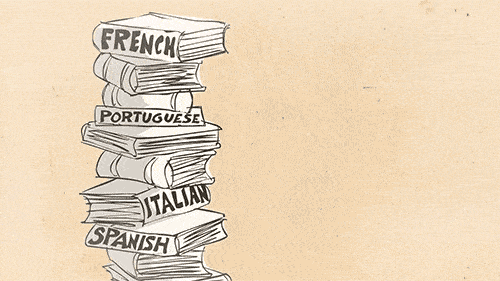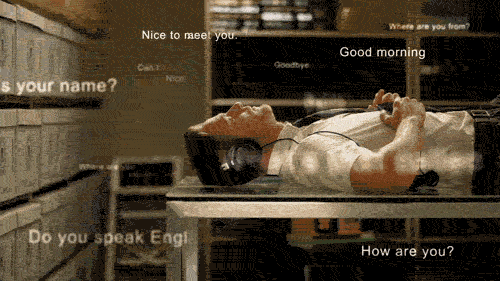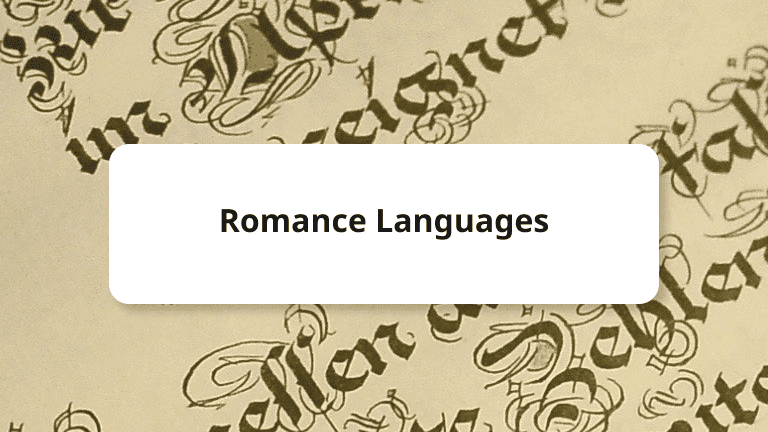Romance languages have the world falling head over heels. You might be under the assumption that Romance languages are named so because the language relates to proclamations of love. But this is not the case.
So what is a Romance language then? The short of it is that they are named after their connection to Rome, but we will touch on this later. Is English a Romance language? Although English has adopted many words from Latin, we’re sorry to disappoint native speakers, it is not officially a Romance language.
An eye-watering number of people in the world speak Romance languages, so if you’re asking yourself the question “what language should I learn?” it’s probably a good place to start.
Even if you’re just trying to learn how to say hello in different languages as a party trick, by the end of this article, you will have all you need to know about romance languages and how they work.

Why Are They Called ‘Romance’ Languages?
At one point you might have thought that they were called Romance languages because they’re the most romantic languages, but rather it stems from Latin. The word “Romance” goes back to the Latin rōmānicus, which meant “Roman.” so all the languages that descend from this type of Latin are now known as the Romance languages.
Many Latin dialects evolved As the Romans traveled and settled throughout Europe during the third and eighth centuries, these dialects are referred to as Vulgar Latin and it’s these that unite all Romance languages. Much like the word “Romance” the word “Vulgar” does not mean in the literal sense “gross” or “rude” but rather it comes from the Latin vulgus, meaning “common people,”
Vulgar Latin was spoken all across Europe thanks to the expansiveness of the Roman Empire. Even when the governmental empire began to collapse, the language was still spread all around the continent. So when individual kingdoms sprang up, the languages drifted apart and started sounding more distinct. Add the various colonial empires to the mix and we have what we know today as the Romance languages.

Romance Language Speakers
We mentioned earlier that an eye-watering amount of people speak a Romance language, but just how big is that number?
First, let’s establish just what the Romance languages are. There are 5 major Romance languages in total. If you ask the question “is Spanish a Romance language?” you’d be very correct (543 million) as it is the most widely spoken of the Romance languages. Other Romance languages in the big 5 include French (267 million), Portuguese (258 million), and Italian (68 million), but the last one might shock you. If you asked, “is Romanian a Romance language?” (24 million) then ding ding ding we have a winner.
If we tally up the numbers there are more than 900The Romance languages, sometimes referred to as Latin languages, most widely spoken of Romance languages are Spanish, Portuguese, French, Italian, and Romanian. million native speakers of Romance languages globally. Add on the number of second-language speakers then that number sits at over 1.1 billion. Are your eyes watering?
| Language | Percent of speakers |
|---|---|
| Spanish | 6.7875% |
| French | 3.3375% |
| Italian | 0.85% |
| Portuguese | 3.225% |
| Romanian | 0.3% |
Below is a map to help visualise these languages

What are the Top 5 Romance Languages?
1. Spanish
Spanish is a widely spoken language, mostly spoken in the Americas. In fact After Mandarin, Spanish is the second most spoken native language worldwide. So it comes as no surprise that Spanish is the most spoken of the Romance languages.
For native English speakers, learning Spanish is relatively easy. The Spanish language is predominantly a phonetic language, this means that words are pronounced as they are spelt. With around 75% of today’s Spanish vocabulary coming from Latin, you’d be able to learn Spanish fast and set yourself up to progress to the other Romantic languages.
Some English speakers might recognize from the language:
Cigar, Fiesta, Guerilla, Pronto, Tomato
If you’ve never heard Spanish spoken here’s how it sounds:
“Hola, me llamo Juan” – “Hello, my name is John”
2. French
French sounds rich and melodic, so much so that it is often referred to as the language of love. If you looked at a French to English translation the flow of the words would be starkly different . French falls third on the list of the most spoken Romance languages and second on the list of the most spoken languages in Europe after German. So is German a Romance language? No, it’s Germanic and quite frankly doesn’t sound romantic at all.
Around 45% of the English vocabulary is derived from French. In fact, French words have shaped the way we cook. It’s a great starting point for anyone looking to learn the language of love. If you’re looking for tips to learn French there are a plethora of YouTube videos at your disposal and the best apps to learn French are just a click away.
Some English speakers might recognize from the language:
blanching, sautéing, julienne, indulgence, absence
If you’ve never heard French spoken here’s how it sounds:
“Où est un bon restaurant/un bon café?” – “Where is a good restaurant/a good café?”
3. Portuguese
Portuguese is one of the most widely spoken standardised Romance languages in the world today and shares lexical similarities with the Spanish language. In fact it is the second most spoken language in South America, just behind Spanish.
If you’re already learning Spanish then learning Portuguese will be a walk in the park. Don’t believe us? Try translating these 8 common spanish question words into Portuguese and just see how similar they are.
The biggest stumbling block for English speakers who are trying to learn Portuguese would be verb tenses. In Portuguese there are 6 tenses compared to English’s 3 tenses.
Some English speakers might recognize from the language:
Embarrass, Cobra, Chocolate, Cinema, Familiar
If you’ve never heard Portuguese spoken here’s how it sounds:
“Que horas vocês abrem/fecham?” – “What time do you open/close?”

4. Italian
Italian is considered one of the closest languages to Latin because of its similarities in vocabulary and pronunciation. The Italian language might be the most romantic language in the world, even above French, this could be attributed to all the famous poets, writers and artists that emerged from early Italy. It is no wonder people are so interested to learn Italian as Italian is so attractive to the ear because of its so-called ‘melody’.
It was so historically popular it became an official language in 1861, and while every region has its own dialect, the Italian standard is Tuscan.
If you compare the English alphabet of 26 letters, the Italian alphabet contains only 21 letters, that excludes j, k, w, x, and y.
If you’re trying to decide between Italian vs Spanish you should know that they have a lexical similarity of 82%. This means that they’re highly similar. Learning these side by side would be very easy to accomplish.
Some English speakers might recognize from the language:
Finale, Scenario, Opera, Solo, Influenza
If you’ve never heard Italian spoken here’s how it sounds:
“Nella guerra d’amore vince chi fugge” – “In the war of love, whoever runs away wins”
5. Romanian
Romanian might not have been on your list of languages to learn but it’s time to reconsider. Romanian is considered an easy language to learn, especially if you’re a native English speaker. According to the US Foreign Service Institute it’s ranked as a Category I language, which means it’s one of the easiest to learn. This romantic language is spoken predominantly in Eastern Europe, with cheap travel destinations like Budapest and Moldova, learning this language is a no brainer.
Many basic vocabulary items and phrases fit in very well with their counterparts in the other Romance languages. Pronouns, numbers, verb tenses, and verb conjugations are also very clearly Latin-derived.
Some English speakers might recognize from the language:
Perfect, Similar, Epilogue, Tour, Park
If you’ve never heard Italian spoken here’s how it sounds:
“Călătoresc singur” – “I am travelling on my own”

Degrees of Lexical Similarity between the Romance Languages
Some Romance Language speakers can navigate a basic conversation with each other, but it’s typically not the case. These languages all developed from the same base language that speakers may understand each other. The linguistics between the various languages are too far apart for them all to be mutually understood, but there are many similarities between the languages.
Romance Languages all share a great deal of basic vocabulary words and some of the grammar forms are still very similar, though spelling and sound patterns may differ.
The modern languages we know today differ greatly from ancient Vulgar Latin although a similarity is that modern Romance Languages only have two genders (masculine and feminine) whereas Vulgar Latin had three (neutral). Another similarity between Romance Languages is their use of prepositions and word order. Finally, you’ll find that the verb conjugation systems of the Romance Languages are very similar.
Let’s look at some examples of similar words:
Hello
Spanish – Hola
Portuguese – Olá
Thank you
Italian – Grazie
Spanish – Gracias
Goodbye
French – Au revoir
Italian – Arrivederci

All the Romance Languages
We’ve acquainted ourselves with the top 5 Romance languages but there are so many more you’d have to spend your whole life trying to learn even a third of them.
In total there are currently 44 official Romance languages. Some of these include: Aragonese, Aromanian, Asturian, Arpitan, Catalan, Corsican, Emilian, Extremaduran, Fala, French, Cajun French, Friulian, Galician, Istriot, Italian, Jèrriais, Judeo-Italian, Ladin, Ladino, Ligurian, etc. we can go on and on but you get the point.
To make things easier to visualise, here is a family tree of Vulgar Latin

Romance Languages, a Match Made in Heaven
There you have it! You’ve learnt the rich history of the Romance Languages spoken widely throughout the world. We’ve discussed that these languages developed from Vulgar Latin and by proxy the similarities they share.
From elaborating on the top 5 of these languages you now have the option of making an educated decision on choosing the best way to learn a language that works for you. Luckily for you there are hundreds of language learning apps at your disposal. If you’re serious about learning a Romance language then finding a tutor is the way forward.
Over 2 million students recommend AmazingTalker for professional tutoring, check it out and you’ll understand why.
















